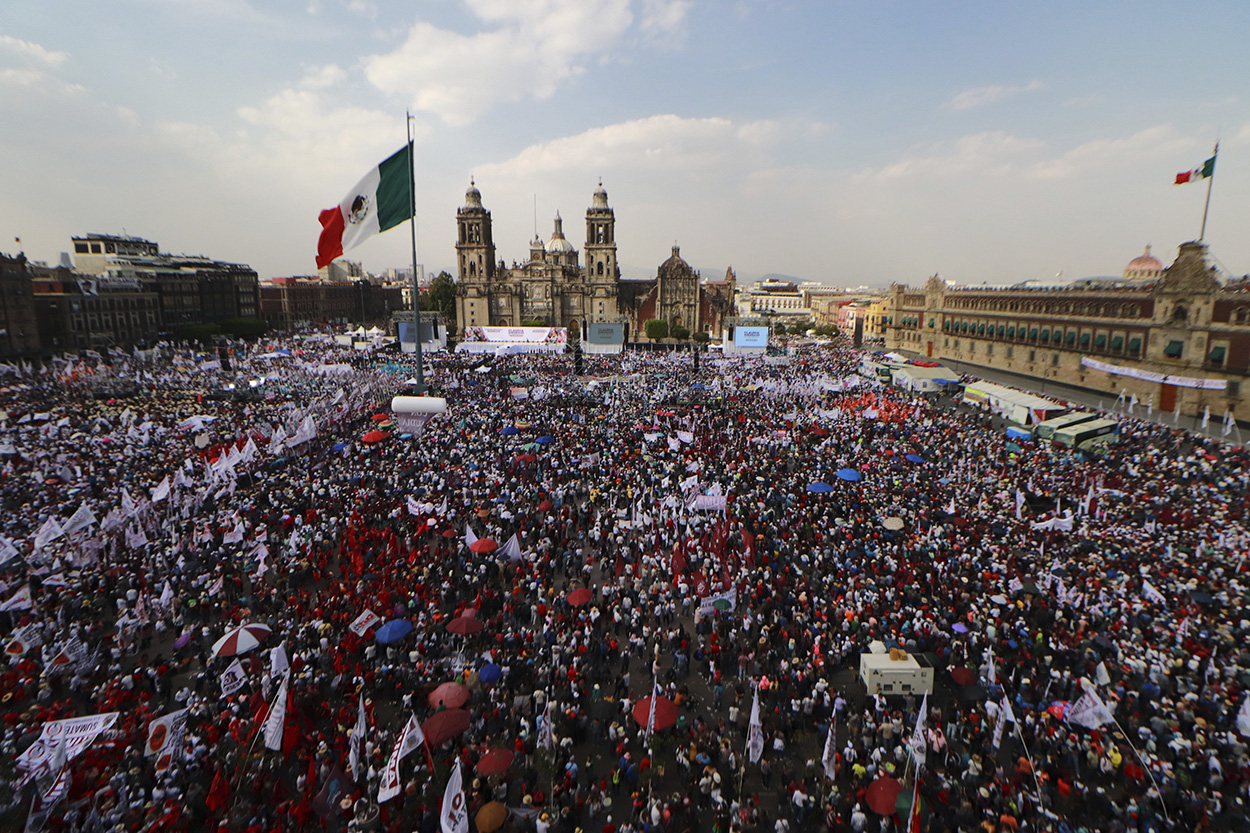Expectations for President Obama's Trip to Mexico and to the Summit of the Americas
Expectations for President Obama's Trip to Mexico and to the Summit of the Americas
AS/COA hosted a joint program preceding U.S. President Barack Obama’s meeting with Mexican President Calderón in Mexico and the upcoming Summit of the Americas in Trinidad and Tobago. The panelists expressed hope the gathering will serve to redefine relations within the hemisphere.
Speakers:
- Congressman Jim Kolbe, Senior Transatlantic Fellow, German Marshall Fund and Senior Advisor, McLarty Associates; Former Chair of the House Appropriations Committee’s Subcommittee on Foreign Operations, Export Financing and Related Programs
- Ambassador Robert S. Gelbard, Chairman, Washington Global Partners; Former Assistant Secretary of State for International Narcotics and Law Enforcement Affairs, U.S. Department of State
- Ambassador Jorge Pinto, President, Jorge Pinto Books; Former Consul General of Mexico, New York and Former Undersecretary of Foreign Affairs, Mexico
- Daniel Dombey, U.S. Diplomatic Correspondent, Financial Times (Moderator)
Introduction
The Americas Society/Council of the Americas hosted a joint program preceding U.S. President Barack Obama’s meeting with Mexican President Calderón in Mexico and the upcoming Summit of the Americas in Trinidad and Tobago. The panelists expressed hope the gathering will serve to redefine relations within the hemisphere. They also urged Obama’s continued support against drug violence in Mexico.
Redefining Diplomatic Relations
The relationship between Mexico and the United States is “perhaps the most perplexing relationship the United States has with any nation on Earth,” said Ambassador Robert S. Gelbard. Despite a shared border and deeply integrated economy, the United States has placed greater emphasis on relations with nations like China, Pakistan, and Afghanistan. Obama, the panelists agreed, needs to “redefine relations” and create a strong partnership with Mexico. A lot more needs to be done, Congressman Jim Kolbe noted; the United States can help to advance democratic institutions, judicial reform, and work against drug trafficking. Gelbard suggested that President Obama appoint an envoy for Mexico issues to convey and represent the region’s interests. The panelists expressed optimism that the meeting between Obama and Calderón will serve to further the U.S. commitment and understanding of a relationship with Mexico.
Panelists agreed the meeting of the two presidents and the upcoming Summit of the Americas will be an opportunity to provide a new framework for the 34 leaders of the Western Hemisphere to engage in high level communication and strategic cooperation. The summit provides a stage, Gelbard explained, for Obama and populist presidents like Hugo Chávez, Rafael Correa and Evo Morales to present and define their hemispheric agendas. The panelists also agreed that issues such as Cuba and immigration reform will be part of the discourse at the summit, but not the overriding issues. Kolbe emphasized that Obama should instead focus on “the hard reality of policies that need to be addressed.”
Partnerships for Prosperous Economic Relations
Economic growth in the United States is key for Mexico’s economy to rebound from the global recession, the discussants agreed. The value of the peso has already risen from 16 pesos on the dollar to 13 pesos on the dollar as the result of modest improvement in the United States, said Ambassador Jorge Pinto. “Adversity presents opportunity,” for the United States and Mexico to rebuild their economies through mutually beneficial partnerships, said Ambassador Gelbard. The panelists suggested investing in education, green technologies, infrastructure, and clean energy with our neighbor.
Mexico’s economy is in relatively good standing despite the global downturn. Whereas 15 percent of multinational corporations are cutting output in China, only 5 percent plan to do so in Mexico, said Congressman Kolbe. Mexico’s close proximity to the United States and the improved capacity of their manufactured sector has created a welcoming and stable environment for investment.
The panelists agreed that President Obama must clearly and immediately act to improve economic relations with Mexico, as well as Latin America. Kolbe argued that President Obama should address the trucking program quickly and effectively. The United States should also pass the pending free trade agreements with Colombia and Panama, the panelists agreed, to strengthen our economic relationships within the hemisphere. Gelbard argued that failure to pass the Colombian Free Trade Agreement will be a powerful statement if the United States supports or doesn’t support its allies.
Cooperation against Drug Violence
Calderón and Obama’s meeting offers the opportunity for the two leaders to collaborate on a combative strategy against drug violence. Drug cartels are vying for control of the $40 billion drug industry, Pinto explained, harming Mexico’s investment, tourism, and image. Currently, 90 percent of all arms used in drug violence in Mexico come from the United States. In her visit to Mexico, Secretary of State Hillary Clinton acknowledged the U.S. role in drug consumption and inadequate control of arms trafficking and money laundering. Now, on the eve of his visit with President Calderón, President Obama has the opportunity to be “part of the solution,” said the ambassador.
There is a “need for speed,” in preserving national security in both Mexico and the United States, said Gelbard. The bulk of the $1.4 billion Merida Initiative has not been dispersed to Mexico yet, he pointed out. Obama’s support is essential to push through changes for distributing the funds and ensuring public support for the plan, the panel agreed. More efficient weapons regulation at the border is essential, Kolbe emphasized. The U.S. government should not allow domestic policies to interfere with issues of national security, Pinto argued. It should review the assault weapon ban.
The panelists emphasized that despite the current turmoil, Mexico is not on the verge of becoming a failed state. that Mexico is in danger of becoming failed state. There is a need for improved border control to stem the flow of illegal drugs, weapons, and funds to move away from a relationship of distrust towards a constructive partnership. The United States should recognize and appreciate the strides Calderón has made in addressing the issue and “stand with him,” said Kolbe.







